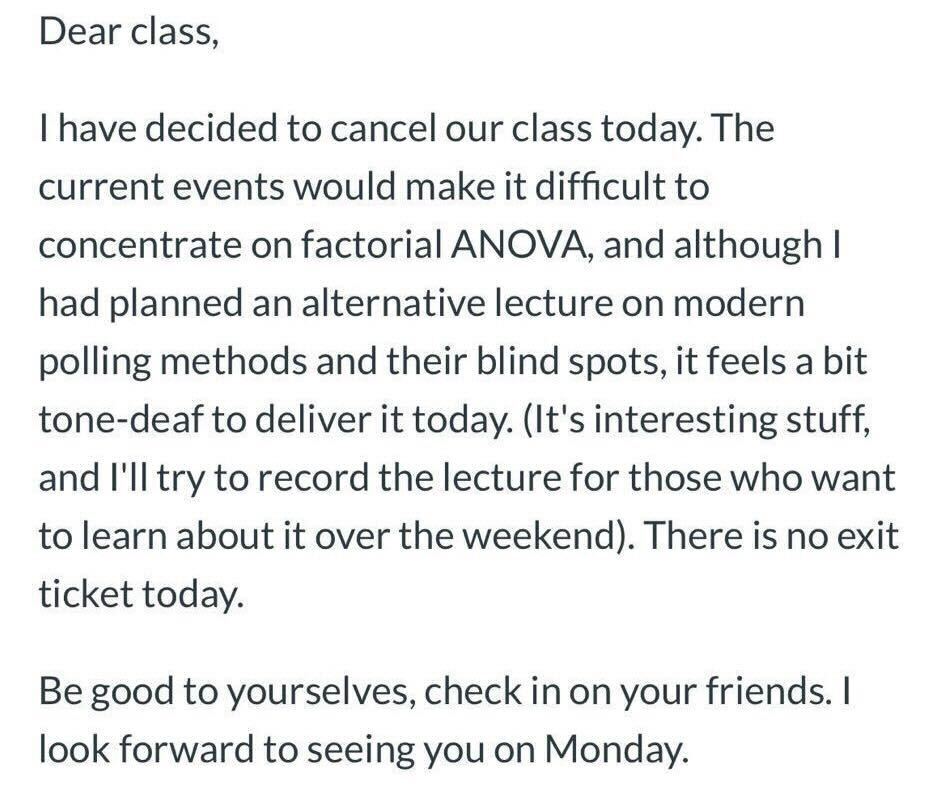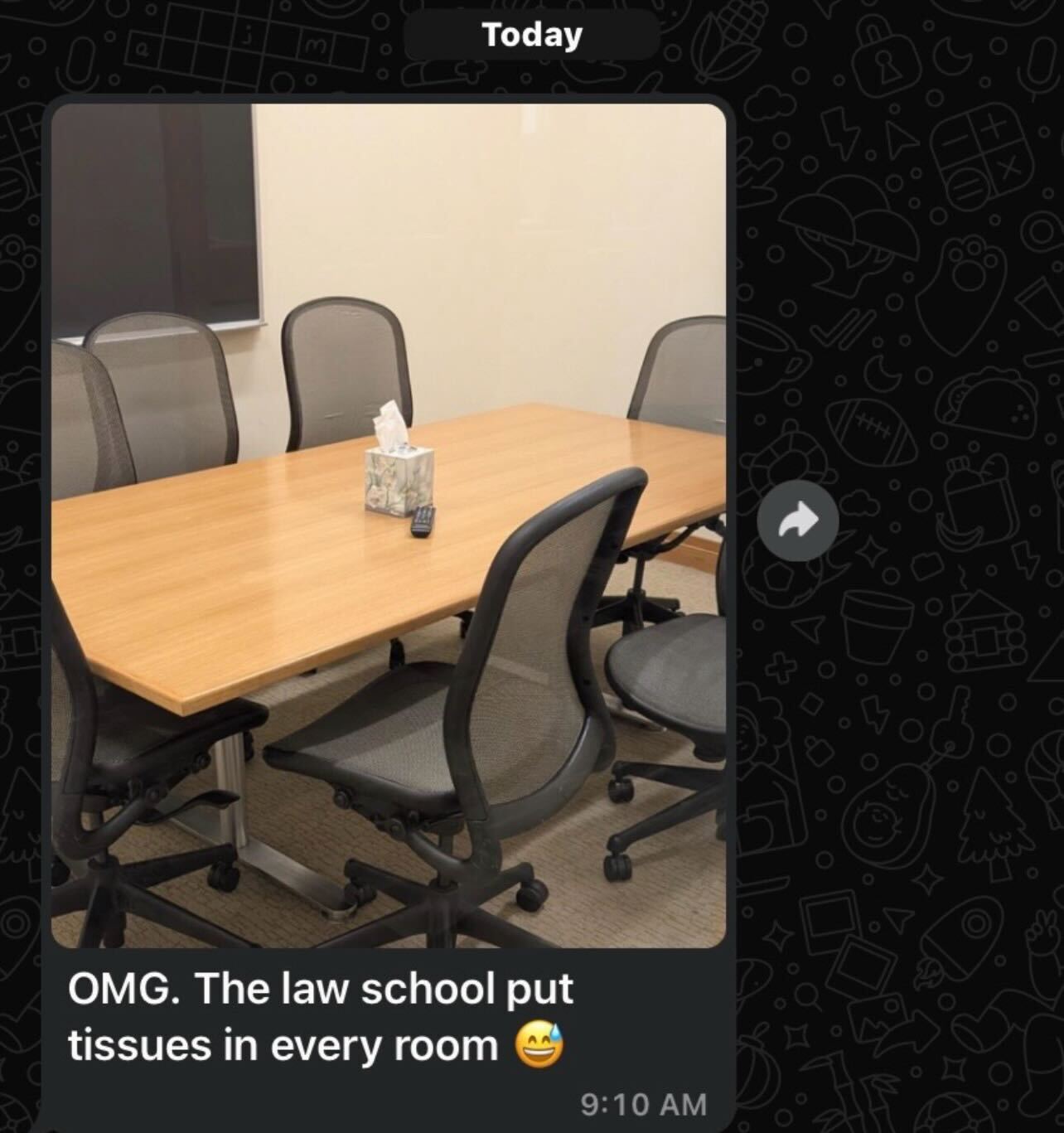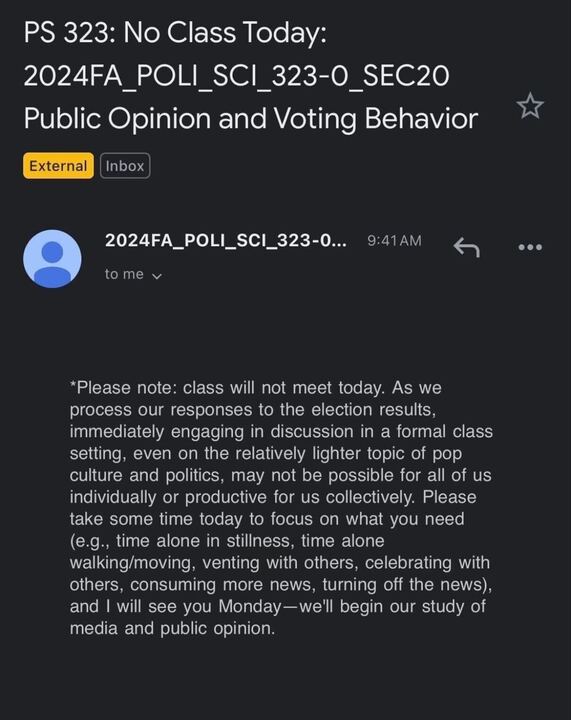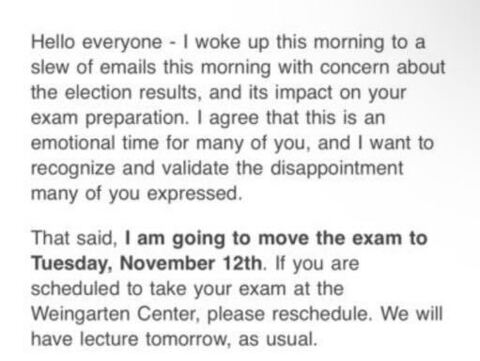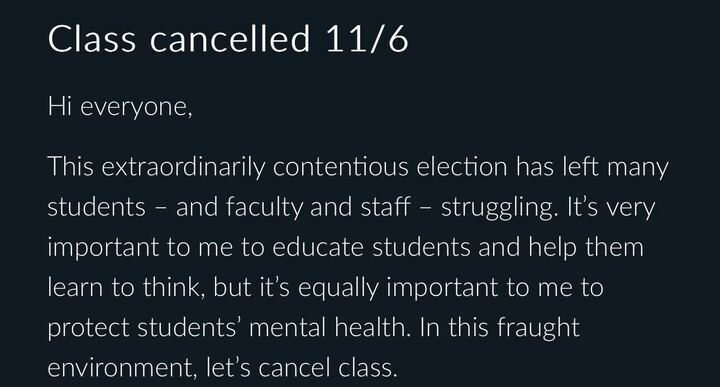After Donald Trump’s historic reelection sent despair rippling across college campuses, grieving professors at America’s top universities canceled classes, rescheduled exams, and promised to forgive poor grades. Schools offered students milk, cookies, puzzles, Legos, and “destress sessions.”
Several professors at Columbia University and its sister school, Barnard College, offered such accommodations for their students, emails reviewed by the Washington Free Beacon show. One Columbia professor granted students permission to skip class, while another gave students an extension on a homework assignment.
“I hope you are hanging in there. I have been think of you over the last few days,” one Columbia professor wrote to her students. “[If] you don’t feel up for class, absences today will be excused.”
A Columbia spokesperson said there were no reports of canceled classes. But Barnard provided more flexibility.
“In recognition of the increased stressed [sic] some of you might be feeling because of the election results, I will offer to replace your midterm Exam 2 grade with your Final Exam grade if better,” one Barnard professor wrote to students. The test was scheduled for Thursday.
A psychology professor, meanwhile, canceled class Wednesday because “it feels a bit tone-deaf to deliver” a “lecture on modern polling methods and their blind spots” to her students. “Be good to yourselves, check in on your friends,” she wrote.
Polls leading up to Tuesday’s election showed Trump and Vice President Kamala Harris in a dead heat across battleground states. Political analysts warned that the contest may not be decided for several days, but the race was called early Wednesday morning. As of Thursday afternoon, Trump had secured 295 Electoral College votes and become the first Republican presidential candidate to secure the popular vote since George W. Bush in 2004.
“I recognize that processing the results of a national election can be heavy and having space to breathe and go a bit slower is vital,” another Barnard professor wrote to students while announcing that class would end early. “I will remain in the room for anyone who wants to use it as a workspace or a space to reflect with others.”
Harvard University professors similarly canceled classes, made quizzes optional, and “stress-baked several pans of lemon bars to share,” the Harvard Crimson reported.
“As we recover from the eventful election night and process the implications of Trump’s victory, please know that class will proceed as usual today, except that classroom quizzes will not be for credit,” economics lecturer Maxim Boycko wrote in a Wednesday email to students. “Feel free to take time off if needed.”
“Many in our community are sleep-deprived, again grieving for glass ceilings that weren’t shattered, fearful for the future, or embarrassed to face our international colleagues,” physics professor Jennifer E. Hoffman wrote in an email. “I stress-baked several pans of lemon bars to share.”
Harvard’s law school, meanwhile, put tissue boxes in every classroom, according to one student.
A Northwestern University political science professor also canceled a class on public opinion and voting behavior.
“Please take some time today to focus on what you need (e.g., time alone in stillness, time alone walking/moving, venting with others, celebrating with others, consuming more news, turning off the news),” the professor wrote in an email obtained by the Free Beacon.
Like their fellow Ivy League colleagues, University of Pennsylvania professors also canceled classes following Trump’s victory, with some rescheduling exams.
“I agree that this is an emotional time for many of you, and I want to recognize and validate the disappointment many of you expressed,” an anthropology professor wrote while postponing an exam until Tuesday.
Another professor canceled class and invited students to her home to “talk or just hang out” and to participate in a “Board Game night” Wednesday evening.
“This extraordinarily contentious election has left many students—and faculty and staff—struggling,” she wrote. “It’s very important to me to educate students and help them learn to think, but it’s equally important to me to protect students’ mental health. In this fraught environment, let’s cancel class.”
On Sunday, Penn hosted a “Care Planning Workshop” with herbal tea and journaling supplies. “Having Feelings About Election Week? Gather to discuss strategies and make a plan for self-care,” a flyer for the event read.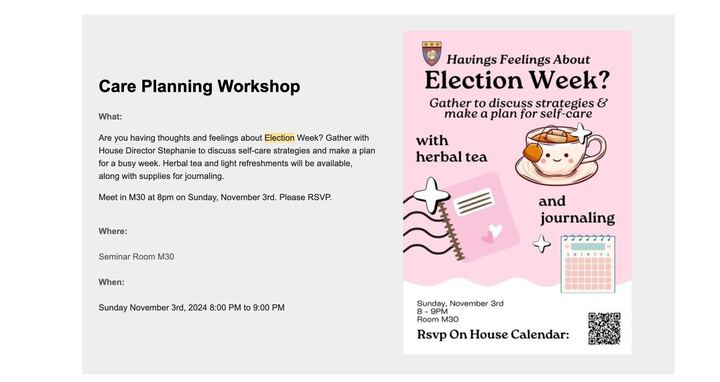
The Penn Women’s Center also held “Election Reflection Drop-In Hours” on Wednesday, while the LGBT Center hosted a “Decompression Drop-in Space,” the Daily Pennsylvanian reported.
Several other universities provided similar opportunities for students to grapple with their emotions. The Massachusetts Institute of Technology, for example, offered a webinar on “Post-Election Stress,” according to an email provided to the Free Beacon by a student who said the invitation was sent to the entire math department.
“While we can’t control the outcome of the election after the final votes are counted, we can learn to effectively cope with our emotional response,” the Tuesday email from MIT read. “Join our post-election virtual workshop to gain information, strategies, and resources that will help you cope with election-related stress.”
The 90-minute workshop offered a number of exercises, including “psychology-backed practices to promote acceptance amidst uncertainty.”
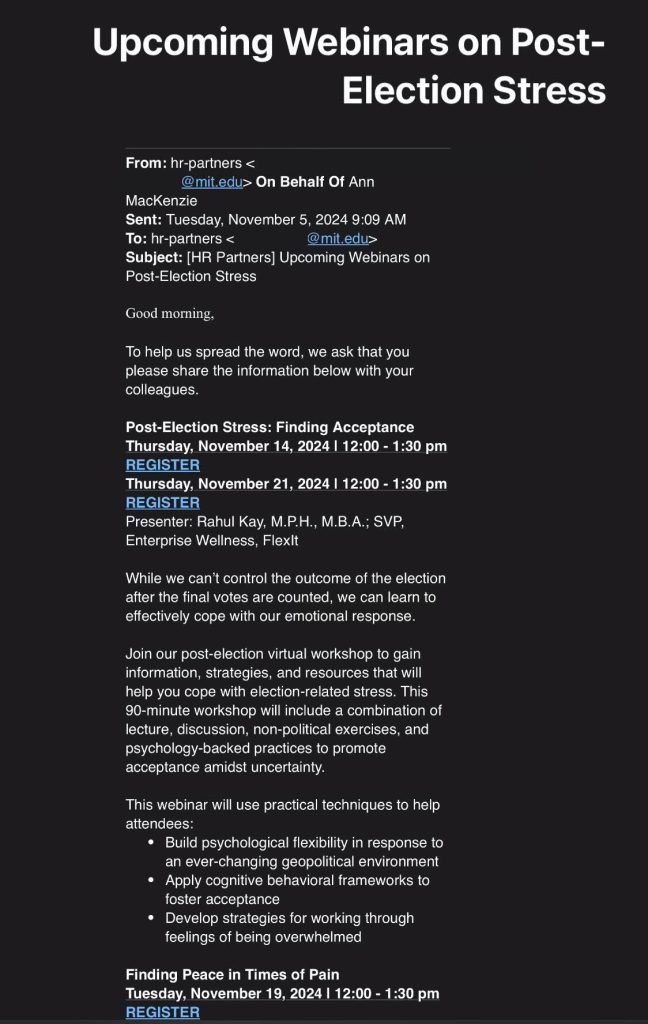
Northwestern provided wellness sessions with puzzles, games, and snacks for students. The college’s Center for Awareness, Response, and Education assured students that it would safeguard their “rights, access to healthcare, and freedom to express [their] gender, sexual, ethnic, and religious identities.”
Duke University planned a number of “destress sessions” for students in the days following the election. Programs included “bubbles and bash,” “meditation,” “mindfulness,” and “debrief.” Claremont McKenna College’s Monsour Counseling and Psychological Services also hosted “30-minute support sessions for election-related stress.”
Cultural centers at Yale University similarly “hosted reflection spaces,” the Yale Daily News reported. The Middle Eastern and North African cultural suite hosted tile painting as “an opportunity for folks to decompress and be in community,” the program’s assistant director said. The LGBT Center held an event on Wednesday to “support students, if people felt very anxious,” according to an organizer for the center.
At Georgetown University’s McCourt School of Public Policy, one of the nation’s top schools for diplomats and policymakers, students spent Wednesday playing with Legos, coloring, drinking milk, eating cookies, and meditating, the Free Press reported.
Barnard, Harvard, Northwestern, MIT, Penn, Duke, and Yale did not respond to requests for comment.



